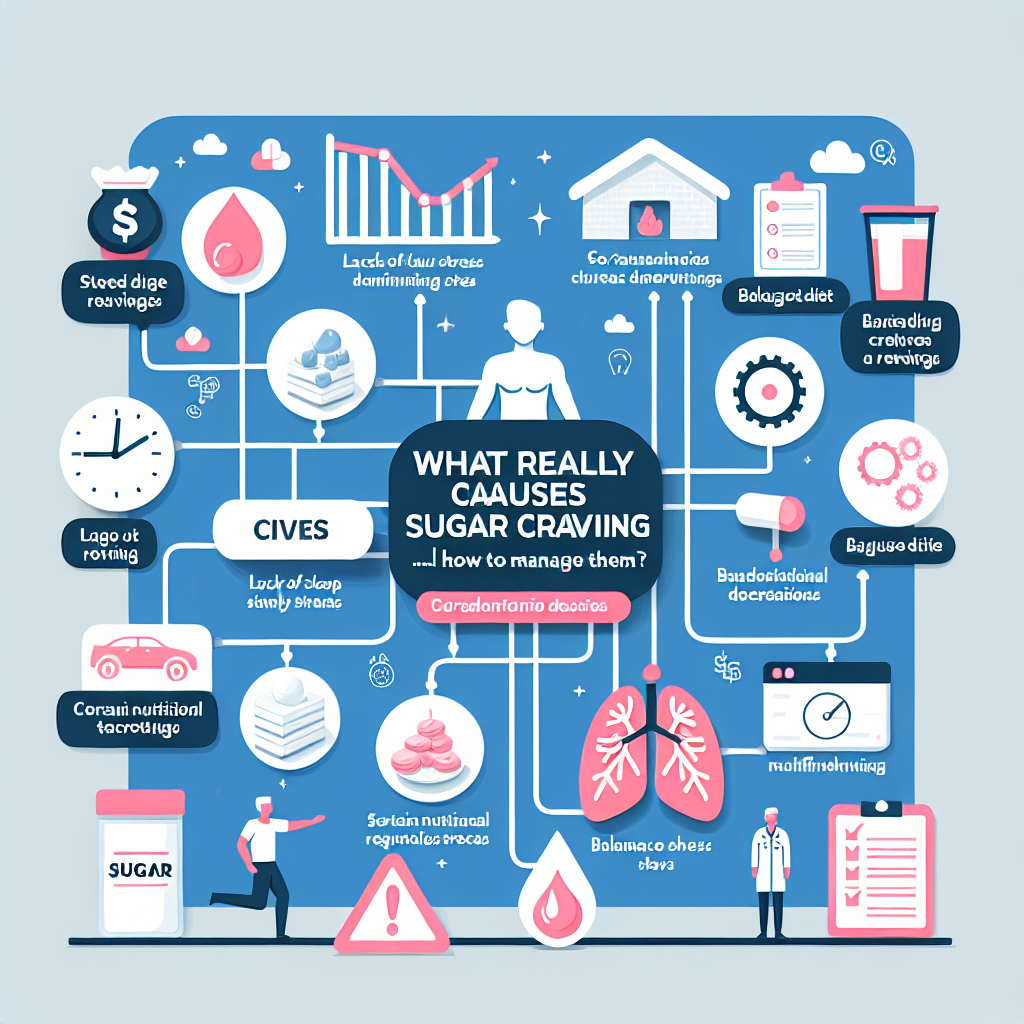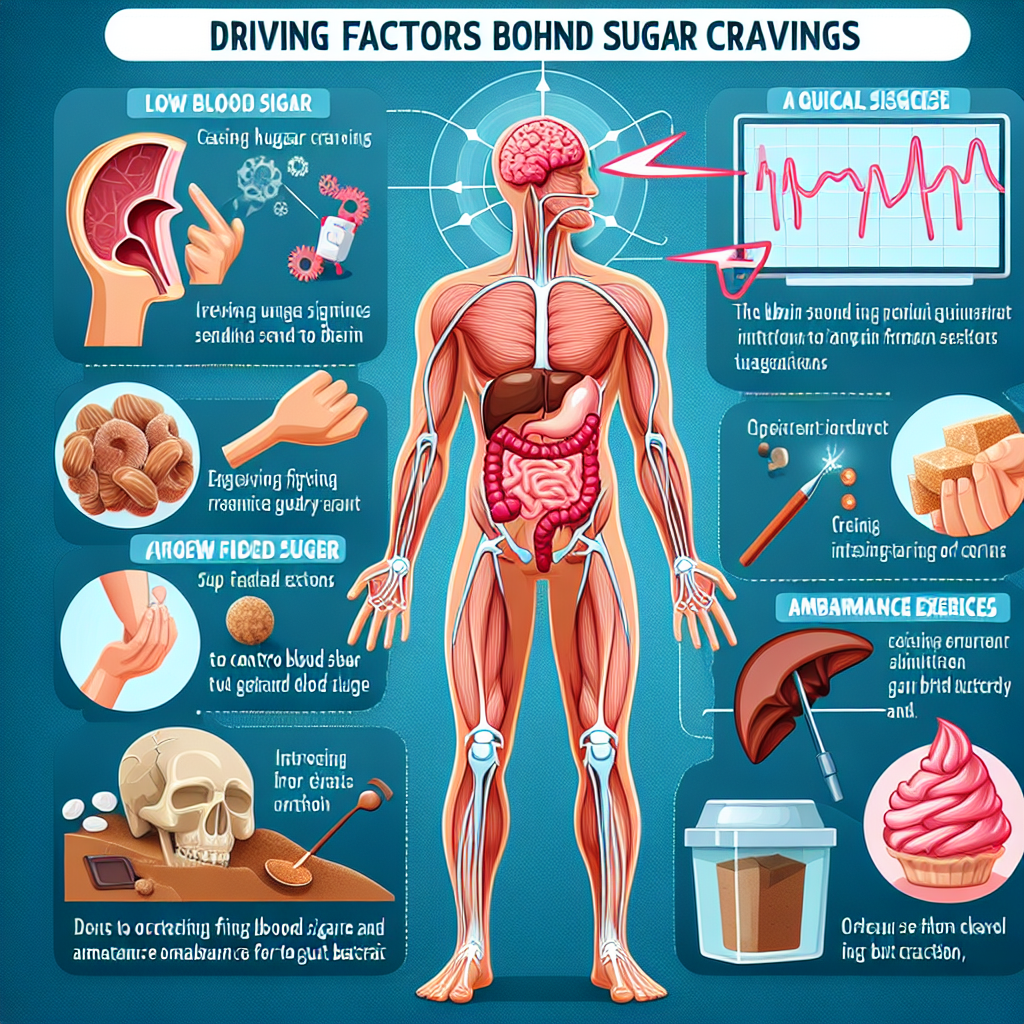What Really Causes Sugar Cravings (and How to Manage Them)

Discover what really causes sugar cravings and learn effective ways to manage them. Empower yourself with knowledge and take control of your health today. Visit My Vibrant Vitality now.
Understanding the Root Causes of Sugar Cravings and Effective Management Strategies
Sugar cravings are a common phenomenon experienced by many individuals, often leading to excessive consumption of sweets and other sugary foods. Understanding the root causes of these cravings and learning effective management strategies can significantly improve one’s health and well-being.
The human body is a complex system that requires a balanced diet to function optimally. Sugar, in moderation, is a vital part of this diet as it provides the body with glucose, which is the primary source of energy for the brain and muscles. However, when consumed in excess, sugar can lead to various health issues such as obesity, diabetes, and heart disease.
One of the primary reasons for sugar cravings is the body’s need for quick energy. When we are tired or stressed, our bodies seek out the fastest source of energy, which is often sugar. This is because sugar is a simple carbohydrate that can be quickly broken down into glucose and used for energy.
Another reason for sugar cravings is the role of sugar in our brain’s reward system. Consuming sugar triggers the release of dopamine, a neurotransmitter that creates feelings of pleasure and reward. This can lead to a cycle of craving and consumption, as the brain seeks out the pleasurable feelings associated with sugar intake.
Hormonal fluctuations can also lead to sugar cravings. For instance, during certain phases of the menstrual cycle, women may experience increased cravings for sweets. This is due to changes in hormone levels that can affect appetite and cravings.
Now that we understand the root causes of sugar cravings, let’s explore some effective strategies for managing them.
One of the most effective ways to manage sugar cravings is to maintain a balanced diet. Consuming a variety of foods rich in complex carbohydrates, proteins, and healthy fats can provide the body with a steady source of energy, reducing the need for quick energy from sugar.
Staying hydrated is another crucial strategy. Dehydration can sometimes be mistaken for hunger or sugar cravings. Therefore, drinking plenty of water throughout the day can help keep cravings at bay.
Regular physical activity can also help manage sugar cravings. Exercise helps regulate blood sugar levels and reduces stress, both of which can help curb cravings.
Mindful eating is another effective strategy. This involves paying attention to what and when you eat, and eating slowly to allow your body time to register feelings of fullness. This can help prevent overeating and reduce cravings for sweets.
Lastly, getting enough sleep is essential. Lack of sleep can disrupt the body’s hunger hormones, leading to increased appetite and cravings for sugar.
In conclusion, sugar cravings are a complex phenomenon influenced by various factors such as the body’s need for quick energy, the brain’s reward system, and hormonal fluctuations. However, by maintaining a balanced diet, staying hydrated, engaging in regular physical activity, practicing mindful eating, and getting enough sleep, it is possible to manage these cravings effectively. Remember, the goal is not to completely eliminate sugar from your diet, but to create a healthier relationship with it.
Decoding Sugar Cravings: What Triggers Them and How to Control Them

Sugar cravings are a common phenomenon that many people grapple with, often leading to overindulgence in sweet treats and subsequent feelings of guilt. Understanding the root causes of these cravings and learning how to manage them can be instrumental in maintaining a balanced diet and a healthy lifestyle.
Firstly, it’s important to understand that sugar cravings are not merely a sign of a lack of willpower. They are often triggered by physiological factors. One of the primary culprits is an imbalance in blood sugar levels. When you consume foods high in sugar, your body responds by producing insulin to help absorb the sugar into your cells. This can lead to a rapid drop in blood sugar levels, causing you to crave more sugar to restore balance.
Another physiological factor that can trigger sugar cravings is a lack of certain nutrients. For instance, a deficiency in minerals such as magnesium, chromium, and zinc can lead to cravings for sugary foods. These minerals play a crucial role in glucose metabolism and insulin function, and their deficiency can disrupt these processes, leading to sugar cravings.
Stress is another significant trigger for sugar cravings. When you’re stressed, your body produces more cortisol, a hormone that increases your appetite and desire for comfort foods, including those high in sugar. This is because sugar can stimulate the release of serotonin, a neurotransmitter that boosts mood and provides a temporary feeling of relief from stress.
Now that we’ve decoded what triggers sugar cravings, let’s delve into how to control them. One effective strategy is to maintain stable blood sugar levels. This can be achieved by eating balanced meals and snacks that combine protein, fiber, and healthy fats. These nutrients slow down the absorption of sugar into your bloodstream, preventing the rapid spikes and drops in blood sugar levels that can trigger cravings.
Another strategy is to ensure you’re getting enough of the nutrients that support glucose metabolism and insulin function. Incorporating foods rich in magnesium, chromium, and zinc, such as nuts, seeds, whole grains, and lean meats, into your diet can help curb sugar cravings.
Managing stress is also crucial in controlling sugar cravings. Regular physical activity, adequate sleep, and relaxation techniques such as meditation and deep breathing can help reduce stress levels and, consequently, curb sugar cravings.
Lastly, it’s important to listen to your body and not deprive yourself completely of sugar. Completely eliminating sugar from your diet can lead to feelings of deprivation and make cravings more intense. Instead, aim for moderation and choose natural sources of sugar, such as fruits, over processed sugary foods.
In conclusion, sugar cravings are often a sign of underlying physiological imbalances or stress, rather than a lack of willpower. By understanding what triggers these cravings and implementing strategies to manage them, you can maintain a balanced diet and a healthy lifestyle. Remember, the goal is not to eliminate sugar completely, but to create a healthier relationship with it.
The Science Behind Sugar Cravings and Practical Tips to Overcome Them
Sugar cravings are a common phenomenon experienced by many individuals. They can be particularly challenging to manage, especially for those trying to maintain a healthy diet. Understanding the science behind sugar cravings can provide valuable insights into how to manage them effectively.
The human body is a complex system that requires a variety of nutrients to function optimally. Among these nutrients, glucose, a simple form of sugar, is the primary source of energy for the body’s cells. When we consume foods high in sugar, our bodies break them down into glucose, which is then absorbed into the bloodstream and transported to the cells for energy. This process triggers the release of insulin, a hormone that helps regulate blood sugar levels.
However, consuming too much sugar can disrupt this delicate balance. When we eat sugary foods, our blood sugar levels spike, leading to a surge of insulin. This can cause a rapid drop in blood sugar levels, leading to feelings of fatigue, irritability, and more sugar cravings. This cycle, known as the blood sugar roller coaster, can be a significant driver of sugar cravings.
Moreover, sugar consumption also stimulates the release of dopamine, a neurotransmitter associated with feelings of pleasure and reward. This can create a powerful association between sugar and pleasure, leading to cravings as our brains seek out this rewarding sensation.
Now that we understand the science behind sugar cravings, let’s explore some practical tips to manage them. Firstly, maintaining a balanced diet is crucial. Consuming foods rich in protein, fiber, and healthy fats can help stabilize blood sugar levels and prevent the blood sugar roller coaster. These foods are also more satiating, which can help curb cravings.
Secondly, staying hydrated is essential. Dehydration can sometimes be mistaken for sugar cravings. Therefore, ensuring you’re adequately hydrated can help keep cravings at bay.
Thirdly, getting enough sleep is vital. Lack of sleep can disrupt the body’s hunger hormones, leading to increased appetite and cravings. Therefore, ensuring you get a good night’s sleep can help manage sugar cravings.
Fourthly, managing stress is also important. Stress can trigger cravings for comfort foods, which are often high in sugar. Therefore, incorporating stress management techniques, such as meditation, yoga, or deep breathing exercises, can help curb sugar cravings.
Lastly, mindful eating can be a powerful tool in managing sugar cravings. This involves paying attention to what and when you’re eating, and eating slowly to allow your body time to register feelings of fullness. This can help prevent overeating and reduce cravings.
In conclusion, sugar cravings are a complex phenomenon driven by a variety of factors, including blood sugar levels, dopamine release, dehydration, lack of sleep, and stress. By understanding the science behind sugar cravings and implementing practical strategies such as maintaining a balanced diet, staying hydrated, getting enough sleep, managing stress, and practicing mindful eating, it’s possible to manage sugar cravings effectively. Remember, it’s not about completely eliminating sugar from your diet, but rather about finding a healthy balance that works for you.